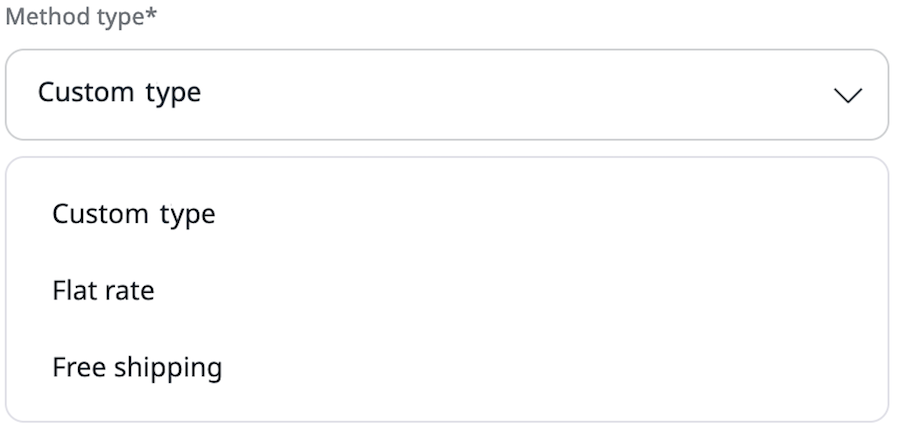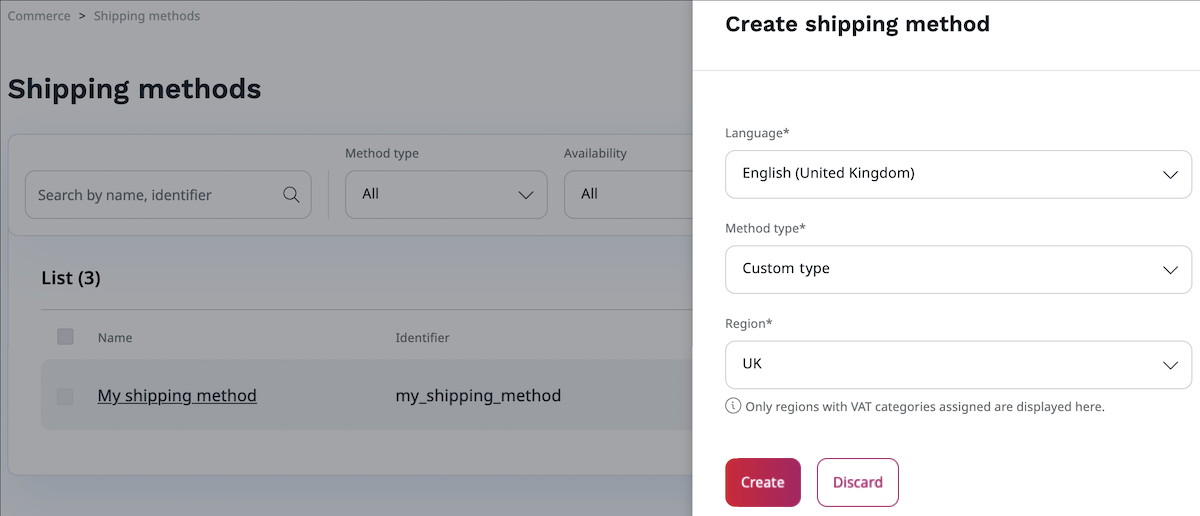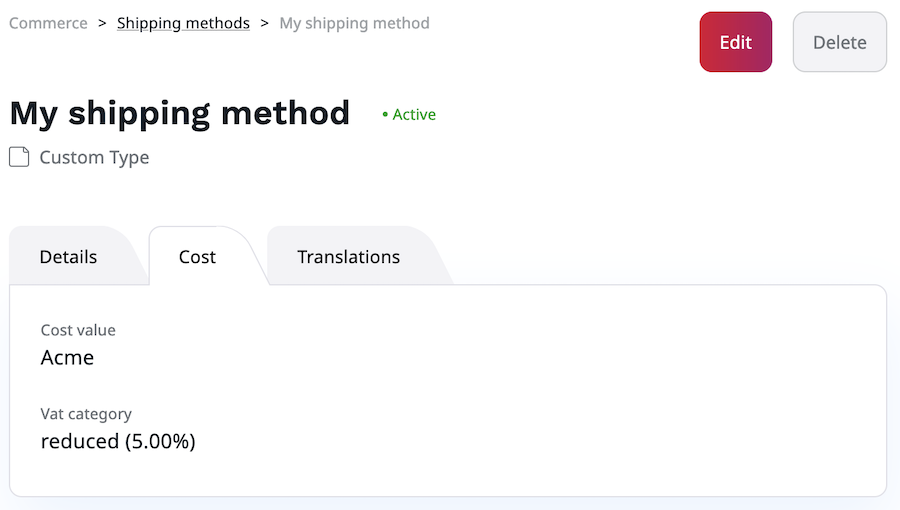- Documentation >
- Commerce >
- Shipping management >
- Extend shipping
Extend shipping
There are different ways in which you can extend or customize your Shipping module implementation.
Here, you can learn about the following ideas to make your Commerce solution more powerful:
- create a custom shipping method type
- toggle shipping method availability in checkout based on a condition
- display shipping method parameters on the shipping method details page
You can also customize the shipment processing workflow.
Create custom shipping method type
If your application needs shipping methods of other type than the default ones, you can create custom shipping method types.
See the code samples below to learn how to do it.
Define custom shipping method type class
Create a definition of the shipping method type.
Use a built-in type factory to define the class in config/services.yaml:
| services:
app.shipping.shipping_method_type.custom:
class: Ibexa\Shipping\ShippingMethod\ShippingMethodType
arguments:
$identifier: 'custom'
tags:
- name: ibexa.shipping.shipping_method_type
alias: custom
|
At this point a custom shipping method type should be visible on the Create shipping method modal, the Method type list.

To let users create shipping methods of a custom type within the user interface, you need a Symfony form type.
Create a src/ShippingMethodType/Form/Type/CustomShippingMethodOptionsType.php file with a form type.
Next, define a name of the custom shipping method type in the file, by using the getTranslationMessages method.
1
2
3
4
5
6
7
8
9
10
11
12
13
14
15
16
17
18
19
20
21
22
23
24
25
26
27
28
29
30
31
32
33
34
35
36
37
38 | <?php
declare(strict_types=1);
namespace App\ShippingMethodType\Form\Type;
use JMS\TranslationBundle\Model\Message;
use JMS\TranslationBundle\Translation\TranslationContainerInterface;
use Symfony\Component\Form\AbstractType;
use Symfony\Component\Form\Extension\Core\Type\TextType;
use Symfony\Component\Form\FormBuilderInterface;
use Symfony\Component\OptionsResolver\OptionsResolver;
final class CustomShippingMethodOptionsType extends AbstractType implements TranslationContainerInterface
{
public function getBlockPrefix(): string
{
return 'ibexa_shipping_method_custom';
}
public function buildForm(FormBuilderInterface $builder, array $options): void
{
$builder->add('customer_identifier', TextType::class);
}
public function configureOptions(OptionsResolver $resolver): void
{
$resolver->setDefaults(['translation_mode' => false]);
$resolver->setAllowedTypes('translation_mode', 'bool');
}
public static function getTranslationMessages(): array
{
return [
Message::create('ibexa.shipping_types.custom.name', 'ibexa_shipping')->setDesc('Custom'),
];
}
}
|
Create a translations file translations/ibexa_shipping.en.yaml that stores a name value for the custom shipping method type:
| ibexa.shipping_types.custom.name: 'Custom Type'
|
Next, use the type factory to define an options form mapper class in config/services.yaml:
| services:
app.shipping.shipping_method.custom.form_mapper.options:
class: Ibexa\Bundle\Shipping\Form\ShippingMethod\OptionsFormMapper
arguments:
$formType: 'App\ShippingMethodType\Form\Type\CustomShippingMethodOptionsType'
tags:
- name: ibexa.shipping.shipping_method.form_mapper.options
type: custom
|
At this point you should be able to create a shipping method based on a custom shipping method type.

Note
To use this example, you must have regions. If you don't have regions, refer to Enable purchasing products for instructions on how to add them.
Create options validator
You might want to validate the data provided by the user against certain constraints.
Here, you create an options validator class that checks whether the user provided the customer_identifier value and dispatches an error when needed.
Use the type factory to define a compound validator class in config/services.yaml:
| services:
app.shipping.shipping_method.options.custom_compound_validator:
class: Ibexa\Shipping\Validation\Validator\CompoundValidator
arguments:
$validators: !tagged_iterator { tag: 'ibexa.shipping.shipping_method.options.validator.custom' }
tags:
- name: ibexa.shipping.shipping_method.options.validator
type: custom
|
Then, create a src/ShippingMethodType/CustomerNotNullValidator.php file with a validator class:
1
2
3
4
5
6
7
8
9
10
11
12
13
14
15
16
17
18
19
20
21
22
23
24
25
26
27
28
29
30
31
32
33
34
35
36 | <?php
declare(strict_types=1);
namespace App\ShippingMethodType;
use Ibexa\Contracts\Core\Options\OptionsBag;
use Ibexa\Contracts\Shipping\ShippingMethod\Type\OptionsValidatorError;
use Ibexa\Contracts\Shipping\ShippingMethod\Type\OptionsValidatorInterface;
use JMS\TranslationBundle\Model\Message;
use JMS\TranslationBundle\Translation\TranslationContainerInterface;
final class CustomerNotNullValidator implements OptionsValidatorInterface, TranslationContainerInterface
{
public const MESSAGE = 'Customer identifier value cannot be null';
public function validateOptions(OptionsBag $options): array
{
$customerIdentifier = $options->get('customer_identifier');
if ($customerIdentifier === null) {
return [
new OptionsValidatorError('[customer_identifier]', self::MESSAGE),
];
}
return [];
}
public static function getTranslationMessages(): array
{
return [
Message::create(self::MESSAGE, 'validators')->setDesc('Customer identifier value cannot be null'),
];
}
}
|
Finally, register the validator as a service:
| services:
App\ShippingMethodType\CustomerNotNullValidator:
tags:
- name: ibexa.shipping.shipping_method.options.validator.custom
|
Now, when you create a new shipping method and leave the Customer identifier field empty, you should see a warning.

Create storage converter
Before form data can be stored in database tables, field values must be converted to a storage-specific format.
Here, the storage converter converts the customer_identifier string value into the customer_id numerical value.
Create a src/ShippingMethodType/Storage/StorageConverter.php file with a storage converter class:
1
2
3
4
5
6
7
8
9
10
11
12
13
14
15
16
17
18
19
20
21
22
23
24 | <?php
declare(strict_types=1);
namespace App\ShippingMethodType\Storage;
use Ibexa\Contracts\Shipping\Local\ShippingMethod\StorageConverterInterface;
final class StorageConverter implements StorageConverterInterface
{
public function fromPersistence(array $data)
{
$value['customer_identifier'] = $data['customer_id'];
return $value;
}
public function toPersistence($value): array
{
return [
StorageSchema::COLUMN_CUSTOMER_ID => $value['customer_identifier'],
];
}
}
|
Then, register the storage converter as a service:
| services:
App\ShippingMethodType\Storage\StorageConverter:
tags:
- { name: 'ibexa.shipping.shipping_method.storage_converter', type: 'custom' }
|
Storage definition
Now, create a storage definition class and a corresponding schema.
The table stores information specific for the custom shipping method type.
Create table
Before you can proceed, in your database, create a table that has columns present in the storage definition, for example:
CREATE TABLE ibexa_shipping_method_region_custom(id int auto_increment primary key, customer_id text, shipping_method_region_id int);
Create a src/ShippingMethodType/Storage/StorageDefinition.php file with a storage definition:
1
2
3
4
5
6
7
8
9
10
11
12
13
14
15
16
17
18
19
20
21
22
23 | <?php declare(strict_types=1);
namespace App\ShippingMethodType\Storage;
use Doctrine\DBAL\Types\Types;
use Ibexa\Contracts\Shipping\Local\ShippingMethod\StorageDefinitionInterface;
use Ibexa\Shipping\Persistence\Legacy\ShippingMethod\AbstractOptionsStorageSchema;
final class StorageDefinition implements StorageDefinitionInterface
{
public function getColumns(): array
{
return [
AbstractOptionsStorageSchema::COLUMN_SHIPPING_METHOD_REGION_ID => Types::INTEGER,
StorageSchema::COLUMN_CUSTOMER_ID => Types::STRING,
];
}
public function getTableName(): string
{
return StorageSchema::TABLE_NAME;
}
}
|
Then, create a src/ShippingMethodType/Storage/StorageSchema.php file with a storage schema:
1
2
3
4
5
6
7
8
9
10
11
12
13
14 | <?php
declare(strict_types=1);
namespace App\ShippingMethodType\Storage;
use Ibexa\Shipping\Persistence\Legacy\ShippingMethod\AbstractOptionsStorageSchema;
final class StorageSchema extends AbstractOptionsStorageSchema
{
public const TABLE_NAME = 'ibexa_shipping_method_region_custom';
public const COLUMN_ID = 'id';
public const COLUMN_CUSTOMER_ID = 'customer_id';
}
|
Then, register the storage definition as a service:
| services:
App\ShippingMethodType\Storage\StorageDefinition:
tags:
- { name: 'ibexa.shipping.shipping_method.storage_definition', type: 'custom' }
|
Toggle shipping method type availability
When you implement a web store, you can choose if a certain shipping method is available for selection during checkout.
Here, you limit shipping method availability to customers who meet a specific condition. In this case, they must belong to the Acme company.
Create a src/ShippingMethodType/Vote/CustomVoter.php file with a voter class:
1
2
3
4
5
6
7
8
9
10
11
12
13
14
15
16
17 | <?php
declare(strict_types=1);
namespace App\ShippingMethodType\Voter;
use Ibexa\Contracts\Cart\Value\CartInterface;
use Ibexa\Contracts\Shipping\ShippingMethod\Voter\AbstractVoter;
use Ibexa\Contracts\Shipping\Value\ShippingMethod\ShippingMethodInterface;
final class CustomVoter extends AbstractVoter
{
protected function getVote(ShippingMethodInterface $method, CartInterface $cart): bool
{
return $method->getOptions()->get('customer_identifier') === 'Acme';
}
}
|
Register the voter as a service:
| services:
App\ShippingMethodType\Voter\CustomVoter:
tags:
- { name: ibexa.shipping.shipping.voter, method: custom }
|
Display shipping method parameters in details view
You can extend the default shipping method details view by making shipping method visible on the Cost tab.
To do this, create a src/ShippingMethodType/Cost/CustomCostFormatter.php file with a formatter class:
1
2
3
4
5
6
7
8
9
10
11
12
13
14
15
16 | <?php
declare(strict_types=1);
namespace App\ShippingMethodType\Cost;
use Ibexa\Contracts\Shipping\ShippingMethod\CostFormatterInterface;
use Ibexa\Contracts\Shipping\Value\ShippingMethod\ShippingMethodInterface;
final class CustomCostFormatter implements CostFormatterInterface
{
public function formatCost(ShippingMethodInterface $shippingMethod, array $parameters = []): ?string
{
return $shippingMethod->getOptions()->get('customer_identifier');
}
}
|
Then register the formatter as a service:
| services:
App\ShippingMethodType\Cost\CustomCostFormatter:
tags:
- name: ibexa.shipping.shipping_method.formatter.cost
type: custom
|
You should now see the parameter, in this case it's a customer identifier, displayed on the Cost tab of the shipping method's details view.

Non-matching label
This section does not discuss overriding the default form, therefore the alphanumerical customer identifier is shown under the Cost value label.
For more information about working with forms, see Page and Form tutorial.



